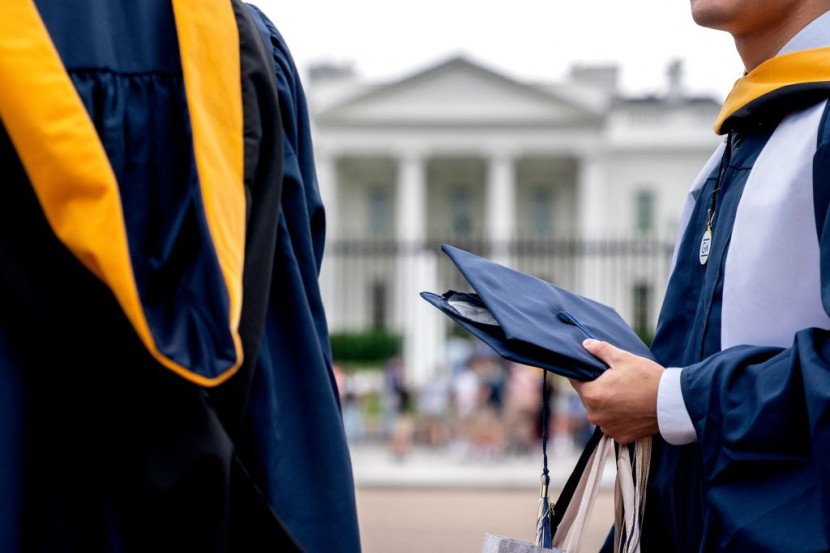
Almost half of the nation's governors have asked President Biden to drop his student loan forgiveness plan, which would wipe up to $20,000 for federal assistance recipients.
On Monday, the GOP governors stated: "As governors, we support making higher education more affordable and accessible for students in our states, but we fundamentally oppose your plan to force American taxpayers to pay off the student loan debt of an elite few..."
The Republican governors contend that low-income Americans will cover the loans of physicians, attorneys, and academics with $50,000 or more in debt, according to NPR.
However, Biden's plan limits assistance to $20,000 for those who were recipients of Pell grants, which are given to low-income students, and $10,000 for students who were not.
Furthermore, the one-time relief is not available to anyone who earns more than $125,000.
The governor's noted: "College may not be the right decision for every American, but for the students who took out loans, it was their decision: able adults and willing borrowers who knowingly agreed to the terms of the loan and consented to take on debt in exchange for taking classes."
"A high-cost degree is not the key to unlocking the American Dream-hard work and personal responsibility is," they added.
It also claims that it is unjust to people who have already repaid their college debts.
Loan Forgiveness May Shoot Up Inflation, Governors Warn
The governors also voiced worry that the forgiveness scheme may push universities to raise tuition and other costs, worsening inflation.
"Your approach pushes the issue to the future and makes today's issues worse for tomorrow's students, rather than addressing the growing expense of higher education tuition or trying to reduce interest rates on student loans."
The forgiveness plan, which would strengthen the economy, was developed primarily as a measure to counteract the negative consequences of the COVID-19 epidemic, Secretary of Education Miguel Cardona told NPR in August.
Biden's student loan forgiveness program is explained by Education Secretary Cardona.
"Everyone knows someone that's struggling post-pandemic," he said.
"And, you know, if we help folks in the communities so that they - reduce the chances of them going into default, everybody wins. It helps the economy."
Read Also : DOJ Issues 40 Subpoenas in a Week, Most Close to Trump, To Expand Jan. 6 Capitol Hill Riot Probe
The 22 Republican governors who have signed the letter are the following:
- Kim Reynolds, Iowa
- Doug Ducey, Arizona
- Brian Kemp, Georgia
- Mike Parson, Missouri
- Chris Sununu, New Hampshire
- Kevin Stitt, Oklahoma
- Bill Lee, Tennessee
- Mark Gordon, Wyoming
- Kay Ivey, Alabama
- Asa Hutchinson, Arkansas
- Brad Little, Idaho
- Greg Gianforte, Montana
- Doug Burgum, North Dakota
- Henry McMaster, South Carolina
- Greg Abbott, Texas
- Mike Dunleavy, Alaska
- Ron DeSantis, Florida
- Larry Hogan, Maryland
- Pete Ricketts, Nebraska
- Mike DeWine, Ohio
- Kristi Noem, South Dakota
- Spencer Cox, Utah
The governors also question Biden's capacity to carry out the proposal.
Schedule For Application For Student Loan Forgivenes Draws Near
The payments for forgiveness may be subject to income tax in seven states.
According to the White House, roughly 90% of people receiving student loan relief make less than $75,000 per year.
Axios reported that a sizable portion of student loan borrowers did not complete a four-year program, which prevented them from benefiting from the increased income that comes with earning a bachelor's degree.
The White House criticized GOP senators who had their Paycheck Protection Program debts forgiven after accusing the Biden administration of handouts.
Application for student loan forgiveness should be available to tens of millions of Americans by the end of the month.
Experts advise borrowers to submit their applications as quickly as possible for several reasons.
Most federal student loan holders will be eligible for some forgiveness, up to $10,000 if they didn't receive a Pell Grant and up to $20,000 if they did, NBC News reported.
The US Department of Education said that a simple form to get this forgiveness will be ready by "early October." In the meantime, borrowers can sign up on its website to get updates on the form's status.
Related Article : Credit Card Companies To Categorize Gun Sales Separately, Allowing Tracking of Firearms
© 2026 HNGN, All rights reserved. Do not reproduce without permission.








